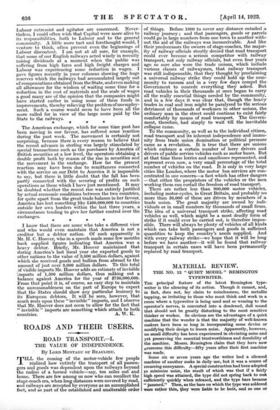ROADS AND THEIR USERS.
ROAD TRANSPORT.—I.
THE VALUE OF INDEPENDENCE. By LORD MONTAGU OF BEAULIEU.
TILL the coming of the motor-vehicle few people realized how entirely the transport of all passen- gers and goods was dependent upon the railways beyond the radius of a horsed vehicle—say, ten miles out and home. There are few among us now who can recollect the stage-coach era, when long distances were covered by road, and railways are accepted by everyone as an accomplished fact, and as part of the established and unalterable order of things. Before 1900 to cover any distance entailed a railway journey ; and that passengers, goods or parcels could go in large numbers from one town to another with- out the aid of the railways was inconceivable. And like their predecessors the owners of stage-coaches, the major- ity of railway officials stoutly denied that road transport could ever become a serious competitor with railway transport, not only railway officials, but even four years ago so sure also were the trade unions, which include various classes of railwaymen, that railway transport was still indispensable, that they thought by proclaiming a universal railway strike they could hold up the com- munity to ransom and in a very few days compel the Government to concede everything they asked. But road vehicles in their thousands at once began to carry all the really essential things needed by the community, and in a few days it was clear that, though the heavy trades in coal and iron might be paralysed to the serious detriment of thousands of workmen in other unions, the ordinary man in the street could continue to exist fairly comfortably by means of road transport. The Govern- ment, therefore, had simply to wait till the inevitable collapse came.
To the community, as well as to the individual citizen, road transport and its inherent independence and immu- nity from trade union domination or political pressure came as a revelation. It is true that there are unions which embrace a certain number of lorry drivers and drivers of public service vehicles such as motor buses. But at that time these lorries and omnibuses represented, and represent even now, a very small percentage of the total number of vehicles on the road. It is only in very large cities like London, where the motor bus services are con- centrated in one concern—a fact which has other dangers —that either the proprietors of the vehicles or the men working them can curtail the freedom of road transport. There are rather less than 900,000 motor vehicles, including motor-cycles, in Great Britain, and probably no more than 50,000 of these are driven by members of a trade union. The great majority are owned by indi- viduals or in small numbers by thousands of small firms. The idea of a universal transport strike, affecting road vehicles as well, which might be a most deadly form of strike if it could ever be carried out, is therefore impos- sible. There will always be plenty of vehicles of all kinds which can take both passengers and goods in sufficient quantities to keep the country's needs supplied. And with every railway strike—we hope that it will be long before we have another—it will be found that railway transport in certain cases will have been permanently replaced by road transport.










































 Previous page
Previous page